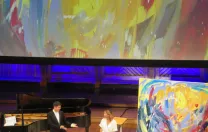In his 3,600-word address in Tercentenary Theatre on the afternoon of October 5, Harvard’s newly inaugurated twenty-ninth president, Lawrence S. Bacow, powerfully restated, and amplified, the University’s commitments to truth, excellence, and opportunity that he emphasized upon his appointment last February. In face of unprecedented public doubts about the value of higher education and the contributions colleges and universities make to society, he made the case for representing higher education more forcefully to the public—while looking inward to ensure that educators live up to their institutions’ values and commitments. In the address (published in full below), Bacow said:
We need, together, to reaffirm that higher education is a public good worthy of support—and beyond that, a pillar of our democracy, that if dislodged, will change the United States into something fundamentally bleaker and smaller.
“Higher education,” he maintained, “has not only supported our democracy, but in some sense it has created it—and we are nowhere near done.” To proceed, universities must embrace “both reassuring truths and unsettling truths,” which arise from those “who challenge our thinking.” Harvard must model the behavior it hopes to see elsewhere, “For if we can’t talk about the issues that divide us here, on this extraordinarily beautiful campus—where everyone is smart and engaged—where the freedom to speak one’s mind is one of our defining precepts—where we are blessed with abundant resources and no one goes to sleep in fear for his or her life—there is no hope for the rest of the world.”
“Our commitment to excellence,” he continued later, “should never be interpreted as an embrace of elitism. The excellence we represent is not a birthright. It is not something inherited by those born privileged—or even by those born with great aptitude. It is defined by more than numbers, and it encompasses spark and imagination, grit and determination.” Accordingly, “We need to remind the nation of the degree to which America’s greatness depends upon this commitment to excellence—and the fact that supporting excellence at college and university campuses does not run counter to the best interests of those who feel left behind by our society.”
A Reader’s Guide to Our Coverage
As for opportunity, this son of refugees was moving and eloquent on the need to welcome and nurture people of talent: “It’s certainly one measure of a just society, how well we treat the least powerful among us. But beyond goodness, we must make the case for common sense: that failing to welcome talented students and scholars from around the world is to undercut America’s intellectual and economic leadership.”
In her inaugural address in 2007—it seems a different era now—historian Drew Faust emphasized universities’ obligations to the past (culture, the arts, their collections) and the future (research, innovation, discovering, and teaching), more than to the present. For Lawrence S. Bacow—social scientist, lawyer, academic leader—the focus is, necessarily, on higher education’s present: full of opportunities for discoveries and progress, but also full of very present dangers.
Fast Start: The President’s Early Agenda
Well before he appeared this afternoon in his presidential gown (they are specially tailored by the venerable firm of Cotrell & Leonard) for his formal inauguration, Lawrence S. Bacow had vigorously inaugurated his presidency. Equipped with three Harvard degrees, deeply steeped in the higher-education community of Greater Boston (and well beyond), and well-versed on the University from his post-Tufts perches at the Graduate School of Education and Harvard Kennedy School, plus his service on the Harvard Corporation, he set a brisk pace upon assuming office, effective July 1:
- He appointed a new dean of the Faculty of Arts and Sciences (the most senior academic vacancy) and a new vice president for alumni affairs and development (ditto administratively).
- Himself a freshman president, he appeared at the reception for the inaugural cohort of participants in the new First-Year Retreat and Experience pre-orientation, to welcome first-generation, low-income, and other students from underrepresented backgrounds to campus and their entry into life at Harvard. A few days later, on a hot move-in day for the class of 2022, Bacow and his wife, Adele Fleet Bacow, donned Move-In T shirts, greeted students and their parents—and even helped schlep stuff from cars to dorm rooms.
- He took the new presidential raiment out for a test drive September 3, deploying a vivid image by telling the class of 2022, at their Freshman Convocation, how they might make the best use of their 21,000 hours at the College.
- The next day, he launched the new academic year at Morning Prayers in Memorial Church, again invoking a vivid image (of an eighth day each week) to get at a fundamental human value, asking, “[H]ow many extra days of the week do we have to add until you would stop and pause and think and reflect on your life, and the world around you?” His own answer, which he said he and his wife seek during Shabbat services in their synagogue, lies in “commit[ting] ourselves to the task of thinking continuously about how we can be our best selves and how we can enable others to do the same—on this, our very first day together, and on every day to come.”
- He sent a gracious “Dear Neighbors” letter to Cambridge residents in the 02138 and 02139 zip codes, noting that he had first moved to town (as an MIT freshman) in 1969, and expressing the hope that in the months and years to come, “we will continue to make progress on affordable housing, sustainability initiatives, and quality public education, among many other shared goals,” in the spirit of town and gown having “provided steadfast support to one another over centuries.”
- At the end of the following week, returning to his boyhood home in Pontiac, Michigan, and visiting Detroit, he made a point of personally talking about the directions in which he intends to take Harvard, emphasizing commitments to areas, people, and problems not always seen as at the top of the University’s agenda; to high-level academic focus on addressing real-world challenges like urban poverty and opioid addiction; and to partnerships with other institutions whose strengths complement—and augment—the University’s.
- The next Friday, addressing hundreds of professors and administrators at the annual teaching and learning conference, he reemphasized the central importance of elevating community members’ sights beyond the comfortable confines of the campus, asking, “How can we ensure that what we are doing here benefits all the students who are trying to learn in America?” And he again stressed the importance of reaching out “as true partners [who] engage with other institutions as humble partners, as generous partners,” willing and able to share what Harvard knows about teaching and learning, and to learn from others what it does not know.
- And on Tuesday, October 2, presiding for the first time at one of Harvard’s oldest traditions, a Faculty of Arts and Sciences meeting (but refreshed: new president, new dean, and a new hour, beginning at 3 p.m., not 4, to fit the new Allston-friendly class schedule introduced this term), Bacow told the full room that it was “an honor” to be there in his leaderly role. He expressed the hope that he would come to know everyone present—but said he would, in the interim, appreciate the professors’ help if they identified themselves when they rose to speak.
The substantive themes, sounded in at least nascent form last February 11, when Bacow was introduced as president, reflect both personal values and elements of his strategy to demonstrate the value of a higher education—and of elite research universities like the one he now leads—to a skeptical public at a time of doubt and peril he has described as unprecedented during his life in academia.
Given the trajectory he has already laid out—collectively, depicting higher education as the “enabler of the American dream”—it might not seem strictly necessary to elaborate further in an inaugural address. But Harvard knows how to stage a shindig; tradition must be served; and its new president has already proven skillful at getting his message across to diverse publics—thereby beginning the sustained labor of setting a huge institution on course to serve what he thinks must be its highest purposes today.
Making Ready
A Harvard-style inauguration resembles the Commencement extravaganza, sans honorary-degree recipients, reunioners, and tens of thousands of parents and friends. By September 24, the familiar tent had spread its wings to shelter the platform alongside Memorial Church, in front of the expected Tercentenary Theatre throng who would bear witness, wet or dry, come October 5.
By Monday, October 1, Harvard’s events staff were rounding into form. Crews hung the bright school banners under a threatening sky: a cheerful sight for the event planners hoping the weather gods would let loose early in the week, and get rain out of their system—as they had declined to do for Drew Faust, 11 Octobers previous.
A temporary public-art installation smack dab in the middle of Tercentenary Theatre was muddily disassembled on October 2, making way for the more familiar installation piece on such occasions: ranks of folding chairs by the thousands. “No parking: special event” signs popped up on Quincy Street’s meters, and the Yard gates bore new placards advising that the place would be closed October 5, with admission by ticket.
In the Old Yard, the twin ravages of high summer heat and millions of touristic footsteps were being obliterated under rolls of fresh sod—and half-a-dozen metal-framed tents sprang up, like giant mushrooms after the recent damp spell, to shelter servers for the post-inaugural fest (and entertainers): the family-friendly “Bacow Block Party,” to come.
Thursday evening was soft and spring-like. Shortly before the concert and artistic celebration in Sanders Theatre, as the Governing Board members and their guests socialized and celebrated at Loeb House, Marc Goodheart, secretary to the boards, and John P. Reardon Jr., the designated master of ceremonies for the next day’s main event, ran through their paces and places on the stage at Memorial Church.
By Friday morning, fresh breezes delivered fall air to New England. Away from the coast, stars and a smile of crescent moon lit the clear sky as the day dawned autumnal—and inaugural.
Read about the Thursday evening artistic celebration here.
Read about the Friday morning academic symposiums here.
Crimson Rituals: The Inaugural Ceremony
Harvard knows how to put on a Harvardian ceremony. The proceedings began with the academic procession into Tercentenary Theatre at 2:06 p.m., led by Reserve Officer Training Corps candidates and the University Band. (Close observers will note that Harvard recognized ROTC in 2011; in 2007, the ROTC cadets led the recessional, at the end of the ceremonies.) Harvard’s leaders—the members of the Governing Boards and the president’s party—were preceded by the University Professors, faculty deans, other Harvard faculty members, and “academic advisers”: Bacow’s Harvard doctoral mentors, still active members of the faculty, whom he recognized and thanked in his remarks later. There were also more than 200 distinguished delegates from other institutions, with Oxford (founded c. 1096) taking pride of place. Its representative, Emma Dench (B.A. ’87, D.Phil. ’93), has multiple Crimson connections, too: as McLean professor of ancient and modern history and of the classics, and, of late, dean of the Graduate School of Arts and Sciences. And so, wearing two hats (or three), she led in the procession of visiting dignitaries, and then assumed her place on the platform with the other Harvard brass.
Among other notable delegates from academic and cultural institutions and learned societies in the procession who have pronounced recent ties to Harvard or its new president were Linda Greenhouse ’68, former New York Times Supreme Court reporter and a former Harvard Overseer (representing the American Philosophical Society); Brian W. Casey, Ph.D. ’00, former associate dean of the Faculty of Arts and Sciences (Colgate, where he is now president); James E. Ryan, past dean of the Graduate School of Education (University of Virginia, president); Joanne Berger-Sweeney, whom Bacow appointed dean of arts and sciences at Tufts (Trinity College, president); Robert H. Giles, former curator of the Nieman Foundation for Journalism (DePauw University, his alma mater); Robert A. Brown, MIT provost when Bacow was chancellor (Boston University, president); A. Clayton Spencer, former vice president (Bates College, president); Paula A. Johnson, former member of Harvard’s medical and public-health faculties (Wellesley College, president); Kathleen McCartney, past dean of the Graduate School of Education (Smith College, president); Sally Zeckhauser, M.P.A. ’73, past vice president (Bryn Mawr College, alumna); David W. Oxtoby ’72, past president, Board of Overseers (Pomona College, past president); and Julio Frenk, past dean of the public-health faculty (University of Miami, president).
No one in the crowd could have been more radiantly happy than Jackie O’Neill, who retired at the end of last year—time enough to hand over the duties as Commencement and inauguration showrunner to others. Attending the celebration without having the slightest responsibility for its success, she confided, was pleasurable beyond measure.
The Inauguration Theme and Fanfare, performed by the Harvard-Radcliffe Orchestra, is home-grown. Williams professor of urban planning and design Jerold Kayden ’75, J.D. ’79, a trumpeter and president of the orchestra as an undergraduate (when he performed for the opening of Gund Hall, where he now works at the Graduate School of Design), began composing it for President Bill Clinton’s inaugural in 1993 (Kayden was then collaborating with Quincy Jones, D.Mus. ’97), but it wasn’t ready on time. After revisions, the piece was performed for the opening of the renovated Harvard Art Museums in November 2014 (listen to a recording here), and subsequently for the dedication of the Center for Green Buildings and Cities’ HouseZero and, on September 20, Smith Campus Center—but today’s performance was its grandest, with the original instrumentation (five brass players and four percussionists) scaled up for the outdoor venue.
In selecting John P. Reardon Jr. ’60 to serve as master of ceremonies, beginning with the call to order, Bacow settled on the living embodiment of the University’s last half-century: associate dean of admissions and financial aid, director of athletics, executive director of the Harvard Alumni Association, adviser to the president and the Governing Boards, Harvard Medalist, etc.—the consummate Harvard people-person. A perfect choice for a cutting-edge research university that is also deeply rooted in 382 years of tradition. Reveling in the occasion, Reardon proclaimed, “What a beautiful day for this great inauguration.”
The choice of “America the Beautiful” as the initial anthem reflects the aspirational nature of the ideals the lyrics express, according to Andrew G. Clark, director of choral activities and senior lecturer on music. As such, it ties to Bacow’s personal narrative as the son of refugees who fled Europe for the United States, to make new lives. Singing the first verse twice invited the audience to participate in the inaugural events, rather than merely observe them. Clark noted further that having seventh-grader Alan Chen join the performance as lead soloist made it explicitly intergenerational—and because he is a Cambridge resident, underscored Harvard’s ties to its home community. For Clark there were particularly meaningful connections to this inaugural day, too: he had the same responsibilities at Tufts University from 2003 to 2010, before coming to Harvard, and came to know the Bacows as “wonderful supporters of the arts and of students’ work.”
•Harvard from great to good. The Reverend Jonathan L. Walton, Pusey Minister in the Memorial Church and Plummer professor of Christian morals, delivered the invocation. “We pray that Harvard will not simply go from strength to strength,” he said, “but from an institution that is great to one that is consistently good—a Harvard that is good to and for our nation and world, good to and for our environment, and good to and for the most vulnerable in society.” He celebrated “a new season in the life of this University,” and called on all present to “continue the work while we yet live.”
Reardon, not beating around the bush, reminded the crowd, “You can sit down” after the prayer: none of this flowery “you may be seated” for him.
•Built for comfort—and for speed. The speakers who followed led off with L. Rafael Reif, president of MIT: Bacow’s undergraduate alma mater and, after his Harvard graduate and professional degrees, his foundational higher-educational home for 24 years, until he became president of Tufts in 2001. As reported, the two leaders have already begun exploring institutional partnerships, and Reif’s signal role suggested a sound basis for those discussions. (At Drew Faust’s inauguration, the similar role was played by Amy Gutmann, president of the University of Pennsylvania, Faust’s academic home before she became Radcliffe Institute dean.) Reif pronounced a “Good afternoon” and, not satisfied with the response, repeated it to elicit a better one, “because I want MIT to hear you”—beginning a call-and-response that each subsequent speaker copied, including (when his time came) Bacow himself.
Reif began on a warm and amusing note, observing:
I have reason to believe that no one may have ever been better prepared than Larry Bacow to lead this extraordinary institution.
I say that because, at MIT, we have spent decades getting Larry ready to take this job.
When he arrived as an undergraduate, we instantly saw his potential. So first, we taught him to love very hard problems. (For a university president, this kind of masochism is essential.)
Turning to the day’s circumstances, he continued:
At one point, it briefly appeared that Larry might have a career collecting advanced degrees from Harvard. But after he earned his third one, when he nearly chose a career in Washington, we intervened.
We steered him to the MIT faculty, and he naturally rose to become our chancellor. That’s when we taught him the fine art of working with faculty over whom you have no actual power. In 2002, we sent him to Tufts, so he could get the hang of being president.
And finally—and this was the tricky part—we had to get him installed on Harvard’s Presidential Search Committee. I am not allowed to reveal our methods. But obviously – it worked!
So as you can see, the best MIT hacks take time!
Speaking of someone with whom he has already begun to work closely, Reif described Bacow as a person in possession of
extraordinary talents and values that have made him one of the most delightful, brilliant, creative, and inspiring leaders in all of higher education: A commitment to excellence. Integrity. Humility. Boldness. A taste for hard facts. An openness to talent and ideas from everywhere.
A passion for collaboration. A strong desire to make a positive impact. And a sense of responsibility to help heal the world.
In times of community crisis, he said, “Larry has proven that, as a leader, he is built to offer comfort. And—as we have seen from his decisive actions in the past three months—he is also built for speed!” The latter attribute, Reif continued, matters especially because “there is no time to lose” in making the case for higher education: “The research university is not an ornament or a luxury that our nation can choose to go without. The residential research university may be the most powerful source of leaders, ideas, and economic growth that the world has ever known.” At a time of public doubt about universities’ role, “It is my dearest hope that, with the inspired leadership of President Bacow, our great universities can prove their value to the nation once again. Moreover, while we continue to be a source of leaders and ideas and knowledge, I hope we can also be a source of healing, and wisdom, and a broad, deep ethic of service to the common good.”
Given Bacow’s status at MIT, Reif said, “I am here to drop MIT’s favorite son off at college.” As a reminder of “home,” he then presented Bacow with a piece of limestone from the original MIT Dome, inscribed,
Lawrence S. Bacow, MIT Class of ’72.
The 29th president of Harvard and a chip off the old block!
The two leaders then embraced warmly.
• What cats! Reif was succeeded by Robin E. Kelsey, Burden professor of photography, dean of arts and humanities and chair of the faculty advisory committee during the presidential search—the first of several representatives offering shorter greetings. In a welcome on behalf of his colleagues, he said:
I will warrant that there is no better company in which to meet the challenges that lie ahead than that merry band of workaholics known as the Harvard faculty. Its members, drawn from a demography wider and more varied than ever before, are passionately committed to the educational mission of this hallowed institution and to its watchword ideal of veritas. Under your leadership, and alongside our extraordinary staff and peerless students, they will devote what brilliance they possess to the transformative process of learning and discovery. You may be charged with herding cats, President Bacow, but what cats!
•Up and ready to go running. The student representative, Catherine L. Zhang ’19, president of the Undergraduate Council, celebrated the new president’s warmth and accessibility:
I first met President Bacow—or Larry, as he likes to be called—in Annenberg Dining Hall, as he was seated among first-years, listening to their Harvard experiences. When school opened this past August, I decided to join Harvard-On-the-Move for a run around campus and Cambridge, and who was there at 7:55 a.m. but Larry, up and ready to go running. From the Graduate Student Council Fall Reception to the Crimson Jam event in the yard, Larry is there with the students and for the students.
The inaugural United States Youth Poet Laureate, Amanda S.C. Gorman ’20, then read her original, rhyming poem for the occasion, “Making Mountains As We Run.” “If there’s something out there written about Larry Bacow, I’ve read it,” Gorman said in an interview: her research for the poem included “everything under the sun” about the new president (as well as an interview with Bacow himself—and, more importantly, with his wife, “because it’s so hard to get Larry to talk about himself”). “Making Mountains As We Run” also digs into her own experiences after two-plus years in Cambridge, and the layers of history and meaning in Harvard’s motto, Veritas.
Gorman is not new to composing and reading poems for special occasions, whether at the Library of Congress, to open the literary season there and introduce Tracy K. Smith’s (’94) inaugural reading as U.S. Poet Laureate, or at an event celebrating the completion of The Harvard Campaign, where she read her original poem “We Are Harvard.”
The proud native Angeleno, who began writing as a way to cope with a childhood speech impediment and published her first collection, The One For Whom Food Is Not Enough, while still in high school, has always combined writing with deeply rooted social activism about issues of race, feminism, inequality, and oppression. At Harvard, she concentrates in sociology—“There’s so much breadth,” she said. “Just as much as my brain is thinking about writing construction and what line I want to use in a poem, it’s also thinking about models we can use to understand women’s rights movements and why they succeed and what their success means, or the narrative frame used by social activists to advocate for gun-control laws.”
Gorman brought that background to the inauguration assignment. After spending weeks “marinating” in her research and ruminations about the president (“There is a swelling of love that surrounds him”)—and reading the work of her lodestar, Maya Angelou, the poet for Bill Clinton’s 1993 inauguration—she sat down to “string the beads together,” as she put it. To bring the words to the page—and stage. Read her poem here.
•Mission- and values-driven. Successor greeters/speakers included Harvard Alumni Association president Margaret M. Wang ’09, who said that from what she has already seen of the new president—"He is community-minded; he is mission- and values-driven; and he deeply cares about educational opportunity”—she knows the extended “alumni community is excited to meet him as well.”
•Gracias mami y papi. Calixto Sáenz, director of the microfluidics microfabrication core facility at Harvard Medical School—and a first-generation immigrant from Colombia—spoke on behalf of the University’s staff. (The staff speaker, an innovation from Faust’s 2007 installation, has been readily incorporated into the institution’s inaugural traditions.)
Sáenz’s life story has resonances with Bacow’s—with education and hard work proving the stepping-stones to success. As an undergraduate in Cartagena, he studied electronics and electrical engineering. After several years as a research-and-development engineer for an international packaging manufacturer, he came to the United States for graduate education, earning a master’s degree in plastics engineering at the University of Massachusetts Lowell—while working as a cashier at HMS Courtyard Café. There he learned of the University’s Bridge Program, which offers employees classes in English as a second language as well as general educational development, computer training, office internships, and citizenship preparation. In 2008, the program helped him secure a part-time internship with the IT department’s help desk, which led to a position in the systems biology department’s microfluidics facility. Sáenz eventually became a full-time researcher, and in 2012, after finishing his master’s and several classes in the Extension School’s bioengineering and nanotechnology graduate program, he was named to his current position as director. He has since created internship opportunities for underrepresented minorities and low-income students attending community college in biotechnology, biology, and engineering.
He narrated some of his life story (“I stand here not only because of the support of my family—gracias mami y papi—but also because Harvard values commitment and perseverance and works to provide opportunities to further the career and professional development of its members”) before broadening the perspective to peers around the institution:
I have been a witness of the integrity and the high standards of Harvard’s work force. Look closely and you will see some of these meaningful everyday acts that I have had the privilege to experience, like Armida and Ever providing warm and welcoming dining services; or Stefano and Rosa who ensure the security of our campus; or people like Jake and Mason supporting information technology, or Carol, Laura, and Becky who intensively provide countless levels of support to our community—in finance, administration, and career development.
All, he said to the president, are “committeed and eager to work alongside you.”
• A really good listener. Finally, speaking for the Commonwealth, another Harvard affiliate (and Crimson basketball alumnus, to boot), Governor Charles D. Baker ’79, reprised the role then-governor Deval L. Patrick ’78, J.D. ’82, LL.D. ’15, played in 2007. From childhood, he remembered the spirit of spirited conversations around his family’s dinner table, Baker said, recalling that his parents valued most of all “whether you were a good listener.” His father cared more about his children being good receivers than good transmitters, and his mother said people had two ears and one mouth for a reason. Speaking forcefully was fine, but, they emphasized, “This isn’t a contest, it's a conversation”—the point of which, over time, was not scoring points but learning to walk in others’ shoes, and gaining in understanding. Bacow, Baker said he had learned, is “a really good listener,” someone who appreciates that listening makes you “smarter and better.” Harvard would be the better for having “somebody who understands that, who gets it, who believes it.”
The penultimate break in the oratorical action was the world premiere of “What Is Good, Op. 1308,” composed by Carson P. Cooman ’04, research associate in music and composer in residence at Memorial Church, and an active concert organist. His vibrant vocal fanfare is a setting to music of Micah 6:8, a text understood to hold special meaning to the Bacows:
You have been told, O mortal, what is good,
and what is required of you:
to do justice, to love kindness,
and to walk humbly with your God.
•Installing the president. Then came the charge and presentation by Harvard’s highest officers to Bacow—the official acts of inauguration, which date back at least to 1708, Reardon said—when the ritual was conducted in Latin. Now, very much in English, the president of the Board of Overseers, Susan L. Carney ’73, J.D. ’77—U.S. Circuit Judge for the U.S. Court of Appeals, Second Circuit—began. She cited Bacow’s “instinct for collaboration and thirst for innovation,” among other strengths, “as you set sail for the adventures ahead.” (Bacow is a lifelong, expert sailor; Robin Kelsey worked in a similar reference in his faculty greeting.)
In an unusually historic tableau, four living Harvard presidents emeriti—Derek Bok, J.D. ’54, LL.D. ’92; Neil L. Rudenstine, Ph.D. ’64, LL.D. ’02; Lawrence H. Summers, Ph.D. ’82, LL.D. ’07; and Drew Faust—had been pressed into service, a convenient number for investing Lawrence Bacow with four symbols of his new office. Bok conveyed the large keys, from 1846; Rudenstine, the oldest College Book, containing records dating back to 1639; and Summers and Faust, the Harvard seals.
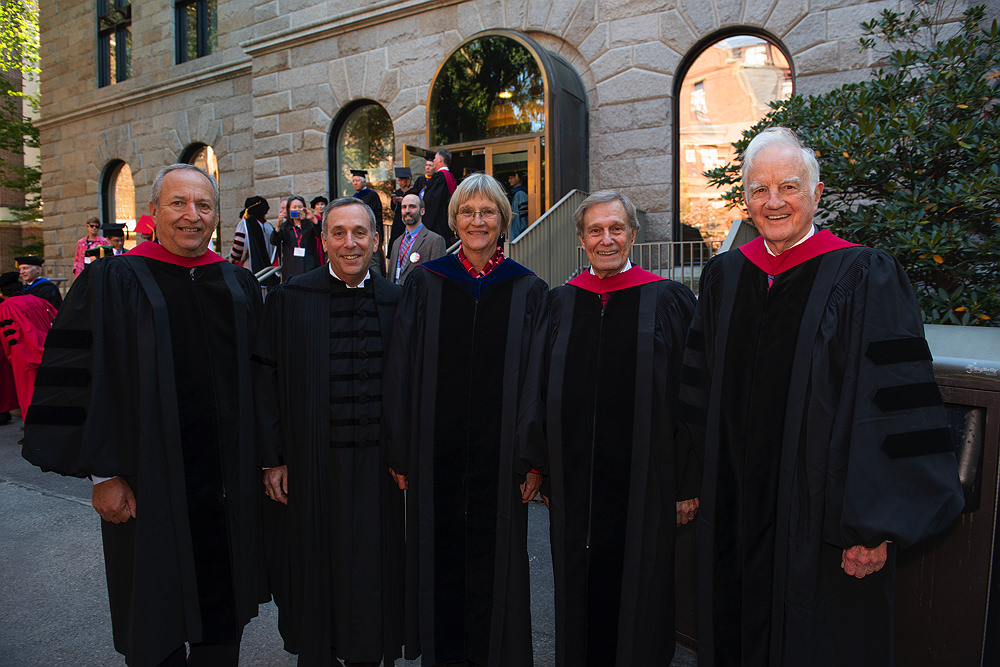
From left: Lawrence H. Summers, Lawrence S. Bacow, Drew Faust, Neil L. Rudenstine, and Derek Bok
Photograph by Jim Harrison
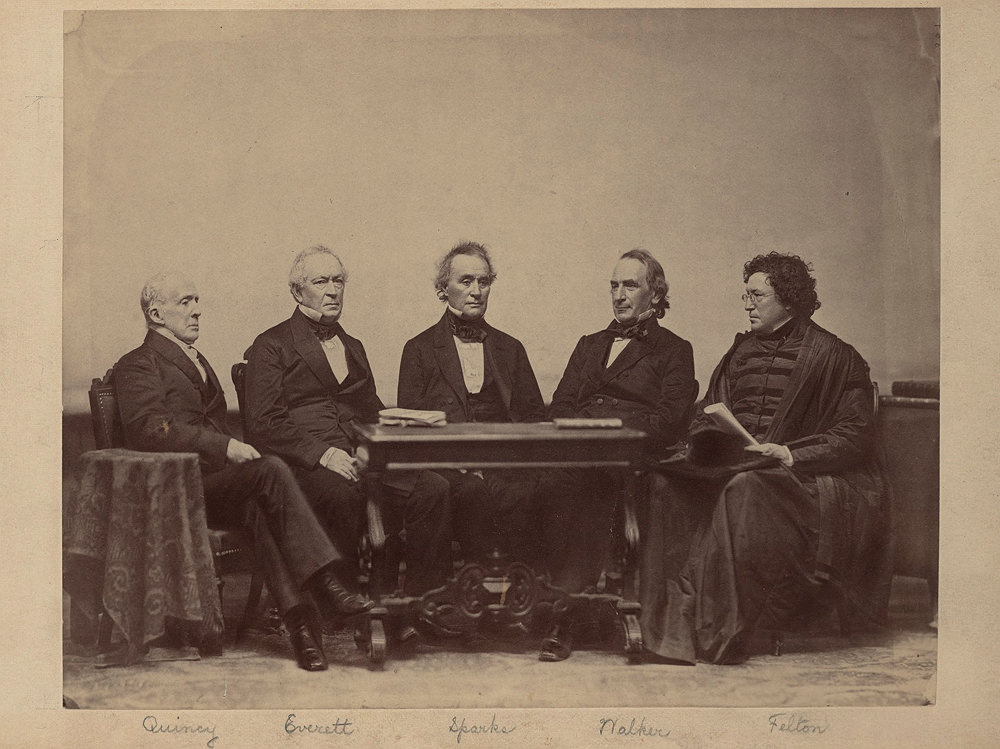
From left: Josiah Quincy, Edward Everett, Jared Sparks, James Walker, and Cornelius Conway Felton
Photograph courtesy of the Harvard University Archives
So far as is known, this is only the second time in Harvard’s nearly four centuries that five living presidents have convened. The earlier occasion—in an era of generally shorter life spans and shorter terms of presidential office as well—was captured in a photograph taken on Saturday, April 27, 1861, “at Mr. Whipples Rooms No 96 Washington Street.” Those presidents (and their terms) were, left to right, Josiah Quincy, A.B. 1790, LL.D. 1824 (1829-1845); Edward Everett, A.B. 1811, LL.D. ’35 (1846-1849); Jared Sparks, A.B. 1815, LL.D. ’43 (1849-1853); James Walker, A.B. 1814, S.T.D. ’35, LL.D. ’60 (1853-1860); and Cornelius Conway Felton, A.B. 1827 (1860-1862; he died in office).
The Corporation’s Senior Fellow, William F. Lee ’72, concluded the formalities by conveying the final symbol of office, the Harvard Charter of 1650, under which the Corporation was established. Before doing so, Lee said those attending had “come together to celebrate a new presidency, but far more, we celebrate an idea”—that higher education is a force for good, for understanding and discovery that “serves the world.” Higher education had been Bacow’s guiding star throughout his life, Lee said, and he hoped that all present would follow that star, too, advancing Harvard, the community, and the world. After Lee and Bacow displayed the Charter, Lee led him to the president’s ceremonial, and famously uncomfortable chair—and in his first decisive act after being inaugurated, Bacow followed Lee’s advice not to sit in it for long.
(Following the inaugural afternoon, the insignia conveyed to Bacow were briefly on display in Pusey Library.)
Then it was time for Harvard’s newest president to deliver his address (see below).
•A mensch. Thereafter, Reardon resumed command, making certain that the proceedings concluded in orderly fashion. The benediction came from the Bacows’ rabbi and close friend, Wesley Gardenswartz ’83, J.D. ’86, senior rabbi of Temple Emanuel in Newton Center. Like Bacow, the rabbi is a former Harvard law student who wandered into a different line of work.
Addressing Bacow directly, he began, “Larry, for the 21 years I have known and loved you I have always been inspired by what a mensch you are. You are ethical and kind, you are decent and humble.” It came as no surprise that during the day, “You did not say a word about yourself. You talked about your parents and your teachers.”
In that spirit, he offered blessings based on what Bacow had learned from his parents and teachers:
- his fourth-grade teacher, Shirley Chandler, who taught the power of listening and learning from others (“Lord, help Larry help Harvard to become a community of listeners, one whose members are humbly and sincerely open to the wisdom of one another.”)
- his late mother, Ruth Bacow, who taught the value of working behind a counter and meeting people in all walks of life (“Lord, help Larry bring the values of openness, service, inclusiveness, and decency—what his parents would call menshlikeit—to this sacred, covenanted community of Harvard.”)
- his late father, Mickey Bacow, who taught by example the power of a strong moral compass—of integrity and character (“Lord, help Larry help Harvard continue to be a place where character shapes destiny.”)
In a deeply emotional conclusion, he cited the lifelong power of teaching, and of Bacow as a teacher and said, “May the students of Harvard, learn, love and live” from that example and declared, “I love you, Larry.”
•Goodness in unity. The speeches and prayer completed, the Inauguration Choir returned to sing the Hebrew conclusion to Chichester Psalms composed by Leonard Bernstein ’39, D.Mus. ’67 (whose centennial is being celebrated this year). In the words of a website on the late composer’s works, Chichester Psalms is “hopeful and life-affirming,” after the despairing Third Symphony (written in memory of the assassinated John F. Kennedy ’40, LL.D. ’56) and, musically, “jazzy and contemporary, yet accessible.”
This a cappella hymn, a part of the Jewish liturgy, is from the text of Psalm 133:1:
Hineh mah tov, | Behold how good, |
That sense of goodness in togetherness and unity (the last word, emphasized in the singing, can be rendered to mean “as one”), choral director Andrew Clark said, makes the piece the ideal response to the community’s inaugural celebration—and to President Bacow’s own emphasis on community purposes and norms.
As Mason professor of music Carol J. Oja, a Bernstein scholar, put it, “It is a brilliant choice, given Bernstein’s connection to Harvard and especially how joyous and ecumenical this piece is”: a Hebrew text, set to music, as commissioned by the dean of the Anglican Chichester Cathedral. The work’s “triumphal, joyous, ecumenical traits are really important and appropriate for this kind of event,” she said. “Plus, it’s really a fun work to perform, so the students will really have a great time, rolling with it.”
Indeed they did.
And then, as one, came the singing of “Fair Harvard,” spruced up with its newly inclusive last line. The last notes of the recessional having wafted skyward, the bells having boomed out their notes at 4:25, well behind schedule—no one was complaining even in the afternoon chill—it was off to party in the Old Yard—there to be fed and entertained.
The featured talent was 21 Colorful Crimson (21CC), a musical group of 21 sophomores committed to spreading messages of inclusion, race consciousness, and diversity (though not always in predictable ways) through song. The cohort, founded by James Mathews ’21, performed a cover of “Ain’t No Mountain High Enough,” followed by “Isn’t She Lovely” (a nod to Adele Fleet Bacow). They also performed their original work, “How You Gonna Hate.” Mathews said that he and his colleagues have been “pleasantly overwhelmed by the attention” they received upon returning to campus this semester, and are excited to continue their performances at Harvard and in Greater Boston area.
For the block party, the Old Yard was transformed into a fairground with live music, dancing, and autumnal snacks like cider donuts, butternut-squash soup, and pumpkin-spiced cupcakes (along with more traditional carnival offerings like cotton candy and buttered popcorn). Students and staff members lined up to make use of inauguration-themed photo booths while faculty members mingled in their academic regalia.
Away from the Harvard Yard hubbub, the sugar maples at Loeb House—where the Governing Boards do their work, and where Lawrence S. Bacow had begun his presidency in July—were in splendid autumn color. Definitively, the seasons had turned—and even more definitively, a new Crimson team’s new season was well begun.
President Lawrence S. Bacow’s Inaugural Address:
“These Are Challenging Times for Higher Education in America”
This truly is an astonishing sight, seeing so many of you here in Harvard Yard today.
It’s a great reminder that nobody gets anywhere of consequence in this world on his or her own—and that includes becoming president of Harvard.
I have been blessed to have people ready to help me at every step of the way, beginning with my parents, who worked hard every day to ensure that I had boundless opportunities. I would not be here today without the love of my life, Adele, who has made my life so meaningful and rich, and without my children, from whom I have learned and continue to learn so much.
I thank all of my family and my dear friends—who are also family—for traveling from far and wide to be here.
I have been blessed, also, by inspiring teachers and mentors, three of whom I am honored to have with me today—my Harvard dissertation advisors—Mark Moore, Richard Zeckhauser, and Richard Light—thank you for having taught me so well. I thank my predecessors—Drew Faust, Larry Summers, Neil Rudenstine, and Derek Bok—for their thoughtful stewardship and leadership of Harvard over the last half-century. I would also like to thank them for their their excellent and thoughtful advice as I take the helm.
A special thanks also to my colleagues from Tufts and MIT, who taught me how to be a leader in higher education. I guarantee you that there are many people here today praying that you taught me well.
Of course, the Harvard presidency seems to involve some unique hazards—and over its long history, a nearly infinite list of potential missteps.
President Langdon, for example, was forced to resign after the students found that his sermons dragged on too long—a great incentive for me to be brief.
President Mather, on the other hand, outraged the entire Harvard community by refusing to move from Boston, arguing that the air in Cambridge did not agree with him. Fortunately, I like the atmosphere here a lot!
Even President Eliot, arguably Harvard’s most successful president, provoked an uproar now and then. He wanted to abolish hockey, basketball, and football, on the grounds that they required team work, and, in his mind, Harvard had absolutely no use for that. He also tried over and over again to acquire MIT.
Rafael, you can relax. I will do my best to avoid all such misadventures.
I am deeply honored to assume the leadership of this wonderful institution, and proud that as the nation’s oldest university, Harvard has helped to shape the American system of higher education, which is magnificent in its independence, sweep, and diversity.
I am also honored that so many other great institutions are represented here today, and I thank all of my colleagues from all over the country and all over the world for your good wishes—and, frankly, your support, because this is not an easy moment to assume the leadership of any college or any university.
These are challenging times for higher education in America.
For the first time in my lifetime, people are actually questioning the value of sending a child to college.
For the first time in my lifetime, people are asking whether or not colleges and universities are worthy of public support.
For the first time in my lifetime, people are expressing doubts about whether colleges and universities are even good for the nation.
These questions force us to ask: What does higher education really contribute to our national life?
Unfortunately, more people than we would like to admit believe that universities are not nearly as open to ideas from across the political spectrum as we should be; that we are becoming unaffordable and inaccessible, out of touch with the rest of America; and that we care more about making our institutions great, than the world better.
While there may be a kernel of truth here, if I believed that these criticisms fundamentally represented who we are, I would not be standing before you today. All of our institutions are striving to make wise choices amidst swirling economic, social, and political currents that often make wisdom difficult to perceive.
We need, together, to reaffirm that higher education is a public good worthy of support—and beyond that, a pillar of our democracy, that if dislodged, will change the United States into something fundamentally bleaker and smaller.
It’s worth remembering that most of the nation’s founders were first-generation college students. They not only shaped our form of government, they built new universities. Having had their own minds opened and improved by learning, they were certain that government by and for the people requires an educated citizenry.
Even at some of the most difficult moments in our national history, our leaders understood that they could strengthen the nation by educating more of our society. Abraham Lincoln signed the Morrill Act during the dark days of the Civil War, creating land-grant universities to spread useful knowledge across this immense raw continent.
President Franklin Roosevelt signed the GI Bill just two weeks after D-Day, making a college education one of the prime rewards for national service, and sending vast numbers of less privileged Americans to college for the very first time.
Every such expansion of higher education—every move towards openness to those previously excluded—has brought the United States closer to the ideal of equality of opportunity for all.
So higher education has not only supported our democracy, but in some sense it has created it—and we are nowhere near done.
My friend Drew Faust has often wished for Harvard that it be as good as it is great. To me, the goodness of Harvard—and all of our universities—lies in the three essential values we represent: truth, or, as we say here, veritas; excellence; and opportunity.
Today, we have to embody and defend truth, excellence, and opportunity more than ever. We do this not to stave off our critics—but because these are the values that made our nation great.
As we consider truth, clearly, we have come a long way from the days when our colleague, United States Senator Daniel Patrick Moynihan, said, "Everyone is entitled to his own opinion, but not to his own facts."
Now that technology has disintermediated the editorial function, allowing anybody to publish his or her own view of events, our fragmented media struggle to make the distinction between opinion and facts. The result, often, is a feverish diffusion of rumor, fantasy, and emotion unconstrained by reason or reality.
And it is precisely because we find ourselves in this post-factual world that strong colleges and universities are essential.
Given the necessity today of thinking critically and differentiating the signal from the noise, a broad liberal education has never been more important. It is our responsibility to educate students to be discerning consumers of news and arguments, and to become sources of truth and wisdom themselves.
Of course, facts and truth are not the same. Facts are incontrovertible, or at least they should be—whereas truth has to be discovered, revealed through argument and experiment, tested on the anvil of opposing explanations and ideas. This is precisely the function of a great university, where scholars debate and marshal evidence in support of their theories, as they strive to understand and explain our world.
This search for truth has always required courage, both in the sciences, where those who seek to shift paradigms have often initially met with ridicule, banishment, and worse—and in the social sciences, arts and humanities, where scholars have often had to defend their ideas from political attacks on all sides.
Now, there are both reassuring truths and unsettling truths, and great universities must embrace them both. Throughout human history, the people who have done the most to change the world have been the ones who have challenged and overturned conventional wisdom—so we should not be afraid to welcome into our communities those who challenge our thinking.
In other words, our search for truth must inextricably be bound up with a commitment to freedom of speech and expression.
At Harvard, our alumni span the political and philosophical spectrum—including those who have served in the White House, in Congress, on the Supreme Court, and in comparable positions throughout the world. Here in Harvard Yard, we must embrace diversity in every possible dimension, because, as Governor Baker has said so eloquently, we learn from our differences—and that includes ideological diversity.
As faculty, it is up to us to challenge our students by offering them a steady diet of new ideas to expand their own thinking—and by helping them to appreciate that they can gain much from listening to others, especially those with whom they disagree. We need to teach them to be quick to understand—and slow to judge.
Let me say that again: We need to teach our students to be quick to understand, and slow to judge. And as faculty, we owe that duty to each other, as well.
To paraphrase the great theologian Reinhold Niebuhr, it is always wise to look for the truth in our opponents’ error, and the error in our own truth.
At Harvard, we must strive to model the behavior we hope to see elsewhere. For if we can’t talk about the issues that divide us here, on this extraordinarily beautiful campus—where everyone is smart and engaged—where the freedom to speak one’s mind is one of our defining precepts—where we are blessed with abundant resources and no one goes to sleep in fear for his or her life—there is no hope for the rest of the world.
At the same time, we should not apologize for standing for excellence in everything we do.
Harvard is synonymous with excellence.
We scour the world for students and faculty prepared to demonstrate brilliance in our classrooms, our laboratories, on our playing fields and performance stages, and out in the community striving to make a difference.
Our commitment to excellence should never be interpreted as an embrace of elitism. The excellence we represent is not a birthright. It is not something inherited by those born privileged—or even by those born with great aptitude. It is defined by more than numbers, and it encompasses spark and imagination, grit and determination.
The excellence we stand for is only achieved through tireless pursuit. Scholarship is about charging down dark alleys, accepting disappointment, and setting off again. It is messy and laborious by definition. Much as we love to celebrate the “Eureka” moments in our society, they are generally preceded by early mornings and late nights.
We need to remind the nation of the degree to which America’s greatness depends upon this commitment to excellence—and the fact that supporting excellence at college and university campuses does not run counter to the best interests of those who feel left behind by our society.
Indeed, it is scholars here and elsewhere who have sounded the alarm about increasing income inequality and declining social mobility in the United States, and whose ideas will help us become the just society we hope to be.
The research we pursue in all fields helps to generate new knowledge, new connections, and new insights into the human condition. We work to understand the origins of life—but also the meaning of life. We explore the molecular code that makes us human, and the culture that is equally essential to our humanity.
Long after the technologies of today are obsolete, people will still be reading Shakespeare and Gabriel García Márquez; listening to Mozart, Bob Dylan, and the late, great Aretha Franklin—from my hometown of Detroit; and contemplating the great questions that have motivated philosophers and poets for millennia. For it is our art, our literature, our music, and our architecture which are among the most enduring artifacts of human endeavor. As the nation’s oldest institution of higher learning, Harvard has a special responsibility to champion intellectual traditions that have defined educated men and women since the dawn of civilization.
We do more than deliver a body of knowledge to our students—we expand their humanity. By teaching young people to appreciate what is beautiful in art, society, and nature—we help them to discover what makes life truly worth living.
Of course, none of our institutions can afford to be complacent about our excellence. We have competitors around the world, supported by governments that understand that the swiftest route to a thriving economy runs through university laboratories, libraries, and classrooms.
Whether our colleges and universities are public or private, we all rely upon the generosity of the American people, who contribute both to research and financial aid. We are excellent because of them, and must endeavor to deserve their support. So it is up to us to remember, always, our collective obligation to the public good.
Since Harvard’s founding in 1636, the people educated here have responded patriotically to the call to service. With the exception of the service academies, more Harvard alumni have received the Congressional Medal of Honor than any other school. Harvard people have always vigorously engaged in the great issues of their day, and at this very moment, 68 of our alumni are running for Congress, on both sides of the aisle. And our alumni throughout the world are also working to improve their nations.
We need to ensure that future generations continue to serve the greater good in a variety of ways. Every Harvard graduate, in every profession, should be an active, enlightened, and engaged citizen. So I am pleased to announce today we will work towards raising the resources, so we can guarantee every undergraduate who wants one, a public-service internship of some kind—an opportunity to see the world more expansively, and to discover their own powers to repair that world.
Of course, we cannot achieve excellence if we are only drawing talent from a small portion of society, so our colleges and universities also must stand for opportunity.
In the broadest sense, all of us are indeed created equal: Talent is flatly distributed. But sadly, opportunity is not.
Throughout our history, higher education has enabled the most ambitious among us to rise economically and socially. And every step this nation has taken to print more such tickets into the middle class, and beyond, has powered our economic growth and leadership in innovation.
We have to ensure that higher education remains the same economic stepping stone for those from modest backgrounds that it was for my generation and my parents’ generation. While a college education still helps to level the playing field for those who manage to graduate, the cost of entry—and of staying the course until graduation—has become daunting for many families.
This is why Harvard’s groundbreaking Financial Aid Initiative, started by Larry Summers and expanded by Drew Faust, is so important. We simply say to low- and middle-income families with earnings below a certain threshold—you can send your child to Harvard and we will ask you to pay nothing. Largely because of this, 268 members of this year’s first-year class are the first in their generation to attend college.
Clearly, however, Harvard cannot keep the American Dream alive single-handedly.
Our nation’s magnificent public colleges and universities, where four out of five American students are educated, are key. But state appropriations are funding a diminishing share of the cost of that education, so tuition and student debt are rising. This trend is not sustainable.
In failing to adequately support public higher education, we are mortgaging our own future. At a time when other countries are investing more in support of higher education, we cannot afford to invest less.
As higher-education leaders, we also need to do what we can do to bend the cost curve. Higher education is one of the few industries where competition tends to drive costs up, not down. It’s time to stop this arms race, and to consider the benefits of greater cooperation.
These can include shared infrastructure for research, joint graduate student and faculty housing, or exchanges that allow us to eliminate some of the redundancies in our curricula and to double down on our specific strengths. I look forward to working with my colleagues at Boston area-institutions to explore how we can collectively do a better job of serving both our students and society.
We also have to explore the opportunities offered by technology to improve productivity and access. I am proud that Harvard, in partnership with our colleagues at MIT, has been a leader in opening up educational opportunities to talented students throughout the world through edX. In turn, those students have us offered new insights into the science of learning.
As college and university presidents, we need to be much franker in framing the choices our institutions make, so as to reveal their true consequences in terms of cost. Traditionally, colleges and universities have been great at doing more with more. But in the future, we may have to do more with less.
At the same time, it is our responsibility to counter any current myths about the value of higher education and to continue telling children, in every corner of this nation and the world, the simple truth: that if they want to get ahead, education is the vehicle that will bring them there.
College has enabled the American Dream for so many of us—and we must nurture and sustain that dream for generations to come.
My parents came to this country with virtually nothing. My father arrived here as a child, a refugee escaping the pogroms of Eastern Europe. My mother survived Auschwitz as a teenager, lived without bitterness, and always was grateful that America was so good to her.
This is a common story—America’s story. With the exception of Native Americans, and the descendants of those enslaved or brought here against their will—most of us can trace our origins back to people who, like my parents, came to these shores seeking freedom and opportunity, and a better life for their children. And many continue to make this journey today, despite enormous risks.
It’s certainly one measure of a just society, how well we treat the least powerful among us. But beyond goodness, we must make the case for common sense: that failing to welcome talented students and scholars from around the world is to undercut America’s intellectual and economic leadership.
In this global economy, financial capital moves at the speed of light, and natural resources also move swiftly. The only truly scarce capital is human and intellectual capital. That is what a nation must aggregate and nurture, if it intends to be prosperous.
Fortunately, many of the best and the brightest from around the world seek to study at America’s great colleges and universities. In engineering, mathematics, and computer science, over half the doctorates awarded each year are granted to foreign nationals. Many of these students return home with their sights raised, and go on to build thriving companies and institutions of higher learning; to fight poverty and disease, and climate change throughout the world; and to lead their own nations towards goodness and greatness.
But a considerable number of these international students will do everything possible to stay right here. Rather than turn them away, we should embrace these extraordinary people. Over a third of our faculty were born somewhere else. Over a third of the Nobel Prizes awarded to Americans in chemistry, medicine, and physics since 2000 have gone to men and women who were foreign-born. Over 40 percent of Fortune 500 companies were founded by immigrants or their children.
America has to continue welcoming those who seek freedom and opportunity—lest we shut the door to the next generation of great entrepreneurs, scholars, public leaders—and dare I say, university presidents—for it is immigrants who get things done, as Lin-Manuel Miranda has said so brilliantly.
I hope that all of us in higher education remain true to our essential values—to truth, excellence, and opportunity. But I hope, as well, that in remaining true to them, we advance those values in the world at large.
It is not enough that we represent the very best of society, in terms of intellectual achievement, freedom to express and explore, and openness to extraordinary potential in all who possess it.
We must defend the essential role of higher education in the life of our nation and the broader world.
And we must reach outwards even beyond that.
We have a responsibility—we have a responsibility—to use the immense resources entrusted to us—our assets, our ideas, and our people—to address difficult problems and painful divisions.
We have a responsibility, as well, to help America remember its own essential goodness: the kindness, decency, and integrity of our founding principles—as well as the kindness, decency, and integrity of those people who have fought throughout our history to ensure that these principles apply equally to all.
It is up to us to leave our country and our world a better place tomorrow than it is today.
That is where true greatness lies.
I am honored to be able to work alongside each and every one of you to reach such greatness.
I am thankful for this opportunity to lead Harvard, which made me better, and which I think makes everyone better—spurring all of us to summit mountains we never imagined we could climb.
Today, I am inspired by the beauty of our mission, our history, and our values—by the power of our ambition, talent, and goodwill—and by the infinite possibilities before us, to use our strengths to help humanity as a whole to ascend.
It is a very great privilege to seize those possibilities with you, and I am delighted to begin.
Thank you.
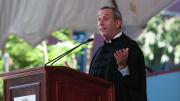
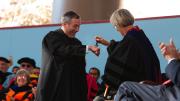
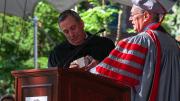
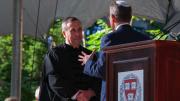
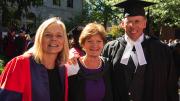
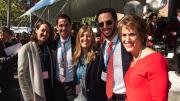
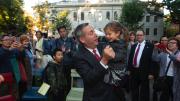
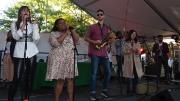
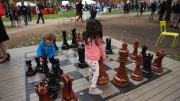
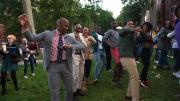
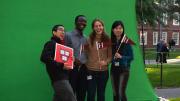
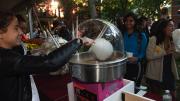
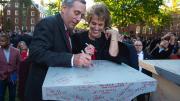
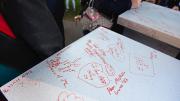
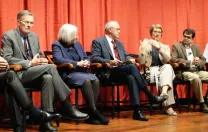
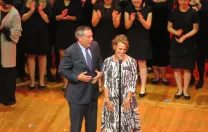 ,
,
